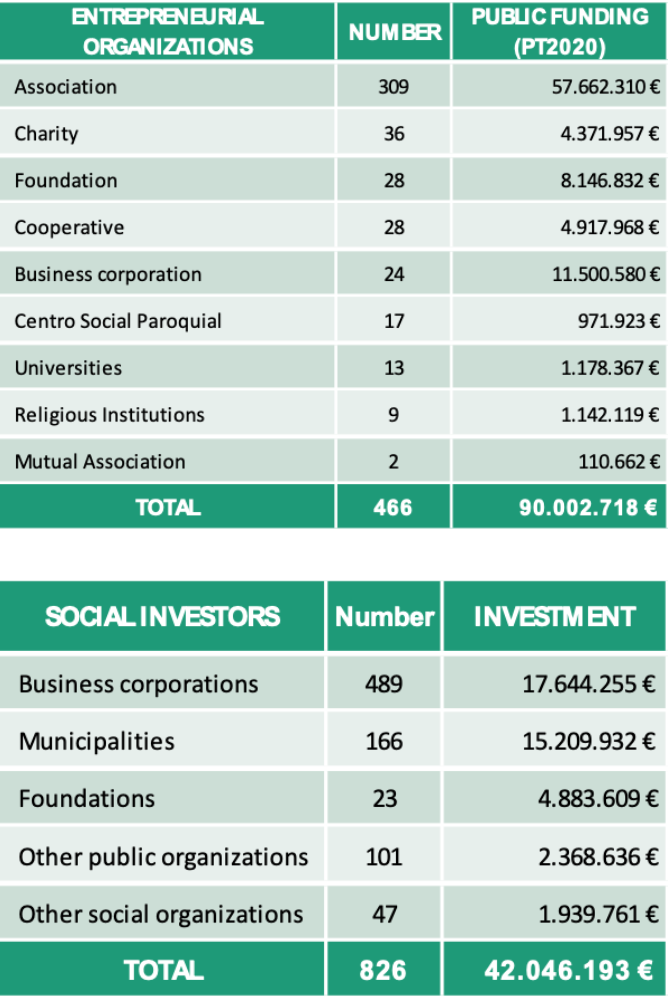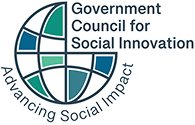Portugal – Checklist of achievements
The Portuguese Government Champions for Social Innovation and Impact (GCSII) Working Group aims to consolidate efforts and expedite the expansion of the global social innovation sector, emphasizing the active involvement of the government.
National Strategy
The 2030 Agenda for Impact (AFI30) is the National Strategy for Social Investment and Innovation in Portugal for the period until 2030. It is the result of the work of the Advisory Board of the National Competence Centre for Social Innovation. This is the fundamental plan behind the public initiative Portugal Social Innovation 2030.
Specific Funding
Suitable financing instruments to finance innovative projects and enterprises as part of the EU funded 2022-2027 European Social Investment Framework (ESIF), in particular under the European Social Fund (ESF +) with a financial allocation for 2022-2027 of 100 million euros managed by Portugal Social Innovation.
The funding model managed by Portugal Social Innovation is pioneering in Europe, mobilising European Union funds to finance innovative and experimental interventions to address social problems. Therefore, as the source of funding is public, European and national, it is relevant to analyse the project’s potential to influence the evolution of existing public policies.
The ESF+ Regulation comprises the cofunding with the State Budget.
Besides the ESF+, The funding model of Portugal Social Innovation comprises the active involvement of public and private investors (blended finance approach).
Regulatory Framework
European Law
Regulation (EU) 2021/1060 of the European Parliament and of the Council of 24 June 2021 laying down common provisions on the European Regional Development Fund, the European Social Fund Plus, the Cohesion Fund, the Just Transition Fund and the European Maritime, Fisheries and Aquaculture Fund and financial rules for those and for the Asylum, Migration and Integration Fund, the Internal Security Fund and the Instrument for Financial Support for Border Management and Visa Policy.
Regulations (EU) Nos 2021/1056, 2021/1057, 2021/1058, and 2021/1060 of the European Parliament and of the Council of 24 June 2021 and Regulations (EU) Nos 2021/1139 and 2021/1147 of the European Parliament and of the Council of 7 July 2021.
Under European regulations, general rules are established regarding the procedures for the analysis, selection, and decision-making of operations to be financed and the financial circuit, imposing on all entities involved in the implementation of European funds, compliance with the Charter of Fundamental Rights of the European Union, the United Nations Convention on the Rights of Persons with Disabilities, as well as the duty to contribute to sustainable development and to preserve, protect, and improve the quality of the environment, taking into account the polluter-pays principle and the principle of ‘do no significant harm’.
National law
Resolution of the Council of Ministers No. 54/2023
Creates the Portugal Social Innovation 2030 initiative and the mission structure responsible for its execution.
Decree-Law 20-A/2023, of March 22nd
Establishes the general regime for the application of European funds of Portugal 2030
Ordinance No. 325/2023 of October 30th
Adopts the Specific Regulation of the Thematic Area Demography, Qualifications, and Inclusion for the programming period 2021-2027
Ordinance 152/2024 updates Ordinance No. 325/2023
Council of Ministers Resolution No. 54/2023
Creates the Portugal Social Innovation 2030 initiative and the mission structure responsible for its implementation
Competence Center (national or regional)
Portugal Inovação Social channels funds into the ecosystem through 4 instruments designed to finance projects that present alternative and innovative approaches to deal with social problems and challenges. The goal of this initiative has been not only to support the development, scaling and financing of new solutions for social problems but rather to create an enabling eco-system for social innovation.
The Business Council for Sustainable Development (BCSD) Portugal is a non-profit association that brings together and represents more than 180 leading companies in Portugal that are actively committed to the transition to sustainability. Their mission is to help their member companies on their journey to sustainability by promoting positive impact for stakeholders, society, and the environment. BCSD Portugal is part of the Global Network of the World Business Council for Sustainable Development (WBCSD), the largest international business organization working in the area of sustainable development.
ESLIDER is the association that represents the social innovation sector, with the mission of promoting social innovation with an impact on society. ESLIDER aims to promote and empower the third sector, representing social entrepreneurs and influencing the social innovation agenda in Portugal. The association responds to the need to professionalize the management of social organizations, boosting their sustainability and effectiveness in achieving their missions. ESLIDER represents Portugal in the EUCLID Network, the European network of social enterprises and impact leaders.
Leading Ministries
Ministry of Territorial Cohesion and Ministry of Labor, Solidarity and Social Security.
Portugal Social Inovation Mission structure is under the responsibility of the member of the Government responsible for territorial cohesion, in coordination with the member of the Government responsible for labor, solidarity, and social security, called the Portugal Social Innovation 2030 Mission Structure, whose mission is to ensure the technical management and coordination of the implementation of the Portugal Social Innovation 2030 initiative.
Gov. Representatives in Charge
President of Portugal Social Innovation
Flagship Programmes / achievements
Portugal Social Innovation has financed 698 projects of social inovation, from wich we would point out 1 example.
Example: The first color identification code for the color blind
SIM CASE STUDY
ColorADD & ColorADD Social
The ColorADD code is a unique, universal, inclusive, and non-discriminatory code that enables colourblind people to recognise colours, whenever colour is a factor of identification, orientation or choice. For each primary colour, there is a corresponding visual code. It was developed in 2010 by the Portuguese graphic designer and professor at the University of Minho, Miguel Neiva. Since its creation, Coloradd has been applied in various services, mainly in Portugal, in several areas such as clothing, textiles and shoes (labelling), pencils, textbooks publishers, transports (subway maps), city administration (e.g. Maps, Accessibility), health (Accessibility and pharmaceutical labelling), food retails (Traffic light nutrition label), Didactic Games etc.
The code is based on five base signs: two triangles (one angled upwards and the other angled downwards), diagonal line, solid square box and empty square box representing black, white and the primary colours: red, blue, yellow. The code is simple and easy to mix across the codes – the same way colours would be mixed to create a different colour.
Lead organisation
ColorADD. Social Associação (Lead partner)
Countries
Portugal
Regions
Alentejo
Algarve
Área Metropolitana de Lisboa
Centro (PT)
Norte
Região Autónoma da Madeira
Região Autónoma dos Açores
Themes
Equal access to social services
Level of action
National
Source of funding
Public – EU
Private
Programming period
2014-2020
Project start
2014
Type of initiative
Empowering people
Participants
52 700 students; 5 800 teachers
Internet and social
https://www.youtube.com/watch?v=p8tMIjc7P7k
EU fund
ESF/ESF+
Sector Size
In 2020 there were 73 851 Social Economy entities. The group of Associations with altruistic goals (AAG) remains dominant, bringing together more than 90% of SE entities. In 2020, the 73 851 SE entities generated 3.2% of national GVA, 5.0% of compensation of employees, 5.2% of total employment and 5.9% of employees (working units expressed, in both cases, in full-time equivalents – FTE). (Source: Statistics Portugal/CASES Social Economy Satellite Account)
Network organisations
International network organisations:
In the European context, Portugal Inovação Social 2030 is part of the Social Innovation+ Initiative, managed by the European Social Fund Agency (ESFA), which promotes the development of social innovation through transnational competitions and the creation of a European Competence Center for Social Innovation. These collaborations strengthen Portugal’s performance in the European context, contributing to the advancement and dissemination of good practices in social innovation. In particular, Portugal Inovação Social 2030 coordinates the pilot initiative of the National Competence Center. actively participates in the Community of Practice (CoP) for Social Innovation, which officially began in 2020 and in which Portugal has taken on the role of Chair. The CoP brings together entities from different Member States to discuss common challenges, share practices and promote mutual learning, contributing to the production of knowledge in the field of social innovation.
Examples fo national network organisations:
GRACE – Responsible Companies is a non-profit public utility business association operating in the fields of Social Responsibility and Sustainability. It is integrated into the European networks Impact Europe and CSR Europe, leaders in sustainability and corporate responsibility, supporting industry sectors and companies globally in their transformation and pursuit of practical solutions for sustainable growth. With a mission to promote and develop a sustainable business culture, we foster the participation of member companies within their respective contexts, focusing on influencing public policies towards sustainability and CSR principles, fostering inter-company networks, developing and leveraging national and international partnerships, disseminating good practices among companies and within the Social Economy, and facilitating closer collaboration between companies and academia.
Rede Capital Social aims at maximizing social impact through a network dedicated to strategic philanthropy, supporting social sector associations with the capacity to scale their actions and have a more systemic impact on society in the medium and long term. The Network aims to act as a catalyst/engine of systemic change in the social innovation ecosystem in Portugal, connecting investors and social organizations and encouraging the use of different network resources to better empower social organizations, scale their actions, and create more impact. The goal is achieved through Venture Philanthropy practices: Support in revamping management methodologies and adopting processes, including digital ones, to ensure impact measurement; Organizing rounds of philanthropic financing for social-purpose organizations that commit to scaling their actions and have predefined impact metrics; Impact measurement and evaluation & Reporting to philanthropic investors.
The RIIS, Network of Investors and Researchers for Social Innovation, is a network in Portugal aimed at promoting social innovation through collaboration between investors and researchers. This network facilitates the meeting between funders interested in investing in social innovation projects and researchers who develop innovative solutions for social challenges. RIIS aims to promote the development and implementation of positive social impact projects by bridging the gap between the academic world and the financial sector to drive social innovation in Portugal.
Ecosystem
Ecossistem catalysed by Portugal Social Innovation 2020:
Potential human impact 1,4 M

Biggest societal challenges
Several documents with political significance have been considering Social Enterprise as an integral part of the social economy, namely the European Commission’s Action Plan for the Social Economy in 2021, the conclusions of the 110th session of the International Labour Conference organized by the International Labour Organization, and the OECD Recommendation on Social and Solidarity Economy and Social Innovation, both in 2022, and the United Nations Resolution on Social and Solidarity Economy for Sustainable Development in 2023. In this context, the António Sérgio Cooperative for the Social Economy (CASES), the Portugal Social Innovation Mission Structure, are building a proposal of detailed guidelines for the creation of the Social Enterprise figure. Following previous reflections, it was concluded that there is a widespread consensus on the three dimensions that characterize the Social Enterprise, derived from the operational concept of the Social Business Initiative (SBI) of 2011 and consolidated through various studies on the reality of each country. Social Enterprises necessarily incorporate three dimensions – economic, social, and governance – and are guided by the principles and values of the social economy, being intrinsically linked to this sector. As there is no consensus on how to materialize this connection, it is considered that both social economy entities and commercial companies should be covered, and that the creation of a statute is the most appropriate solution for the national reality. It is thus proposed by Portugal Social Inovation and CASES to create a Social Enterprise Statute by legal decree, based on specific criteria, encompassing entities with different legal forms, which not only meets the requirements of the European Union for the purpose of framing eligible entities in future community programs, but also integrates the different dimensions mentioned above.


